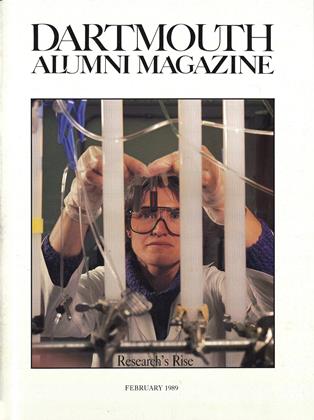Though they live on different coasts and work in quite different professions, two members of the class of 1976 Thad Bennett and Rob Saltzman have one thing in common. Both have been deeply involved in the battle against AIDS, acquired immune deficiency syndrome.
Two years ago "Father Thad" Bennett was the associate rector at the Church of the Good Shepherd in Hartford, Conn., when a member of his parish the boyfriend of a woman whose children Thad had baptized died of AIDS.
It was seven days before Thad visited the woman. He knew he couldn't contract AIDS by going to her house, but he felt uncomfortable, nonetheless. "I had the facts about AIDS in my head but I hadn't talked to my heart." The woman told him she had been fired from her job as a result of her friend's disease.
Witnessing the painful discrimination faced by people with AIDS, their families, and friends made Thad realize that "spreading facts was not going to be enough." He felt the religious community had an obligation to "talk to people's hearts" in a way the medical community cannot. He resolved to help and within nine months had left his parish, with a $15,000 grant from the Episcopal Diocese of Connecticut to start his ministries. He raised an additional $30,000 to meet his budget, and a year after the death of the man from his parish Thad was working fulltime as the director of the AIDS Ministries Program. Its goal: to involve the religious community in responding to the AIDS crisis.
Thad wants to be "out of a job by 1991," and that will happen if all Connecticut ministries are prepared to support people with AIDS. His main task is to act as a facilitator for other religious groups, across denominations, and to create model residences for people with AIDS which he had already begun to do.
On the West Coast, Rob Saltzman was, until recently, special counsel to the director of health services for Los Angeles County. His responsibility was to provide legal and policy advice to the county Health Department, which has an annual budget of $1.3 billion and employs 22,000 people in six public hospitals and 50 public health centers. Rob says, "Because AIDS presents a complex web of medical, legal, and political issues, I was increasingly being called upon to use my government experience and legal training to shape our response to the problems raised."
During the first six months of 1987 Rob worked full-time organizing county services and programs including AIDS education, case management, testing for HIV, development of a five-year plan for services, and lobbying state and federal governments to increase Medicare reimbursements outside of traditional inpatient hospital settings.
"Since AIDS involves sexuality, drug abuse, illness, and death," Rob notes, "the politics of AIDS issues gets very thorny. As a result, the legal aspects of AIDS often surface." Among the difficult questions the legal community faces: Should the county provide free sterile needles to reduce the spread of HIV infections from drug users to their sexual partners and their newborn children? Under what circumstances should HIV testing be encouraged? Should marriage license applicants be tested? If so, what use do you make of a positive result? Should AIDS education be mandated in schools? At what age? Who approves the content?
"It scares me to think that most people still seem unaware of the proportions of this epidemic," says Rob. In Los Angeles alone as many as 200 new cases are reported each month. "All sexually active adults, and parents of sexually active children, should know the risks of AIDS transmission and how to avoid them." He adds, "The impact of AIDS policy we implement now will be felt for years to come. As the years go by, we will all be affected by the epidemic." (A few months ago Rob was tapped for a different challenge; he is now associate dean of the University of Southern California Law Center.)
Our class, and the much wider community, can be grateful that people such as Thad and Rob are trying to solve a problem that most people aren't prepared to tackle.
 View Full Issue
View Full Issue
More From This Issue
-
 Cover Story
Cover StoryThe Rise of Research
February 1989 By Anne Bagamery '78 -
 Feature
FeatureGeorge's College
February 1989 By Constance E. Putnam -
 Feature
FeatureA Story of Drama, Fierce Competition, Mom and Apple Pie
February 1989 By George Canizares -
 Article
ArticleREVIEW STUDENTS ARE BACK
February 1989 -
 Class Notes
Class Notes1988
February 1989 By Chuck Young -
 Class Notes
Class Notes1982
February 1989 By Peter Frechette







